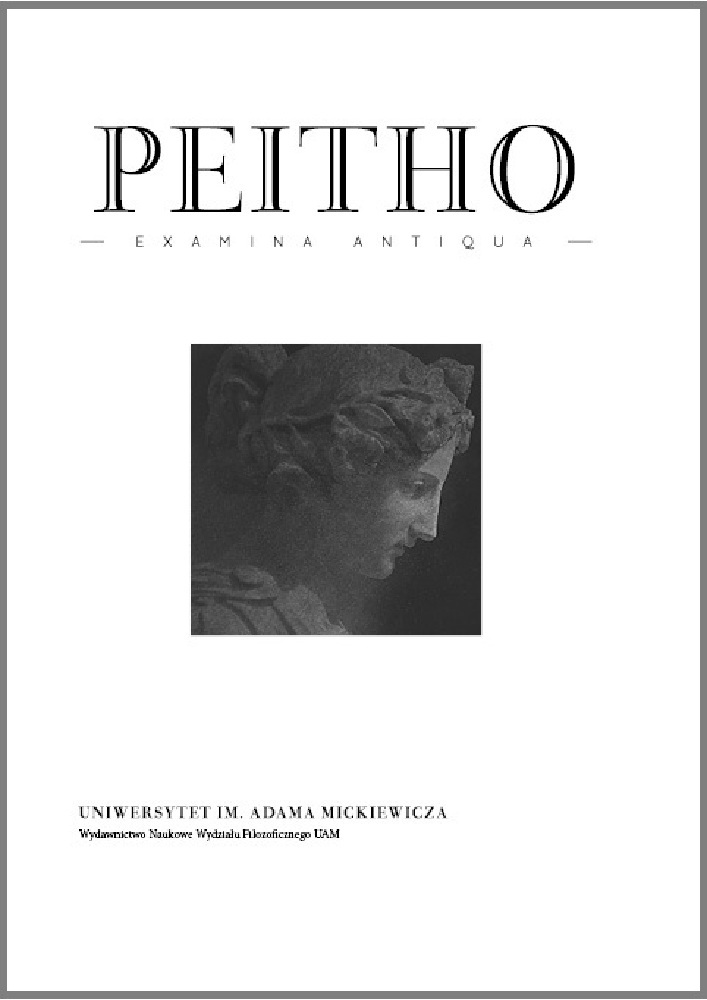Abstract
In Hermias’ commentary on Phaedrus (In Platonis Phaedrum Scholia), it is possible to identify several direct references to the philosophers and pre-Socratic doctrines, including Pythagoras. We point out to three references to Pythagoras in Hermias: (1) Pythagoras is characterized as an unwritten philosopher, (2) there is a special connection with the divinities and Muses, and (3) there is a special connection with the Phaedrus dialogue, revealed by the affinity between Pythagoras and Socrates. We show how the explicit references to Pythagoras in Hermias constitute a certain method of interpreting Platonism: as a philosophy manifested in writing, but which, at the same time, values the unwritten tradition, represented especially by Pythagoras and Socrates. We also demonstrate how the references translated and examined here reveal the image of this Neoplatonic Pythagoras of Hermias, an image which is not necessarily in tune with the oldest doxography, and which permits the reevaluation of Plato’s position as a philosopher who sought to combine unwritten doctrines with his explicit activity as a writer.
References
Bernabé, A., 2003, Hieros Logos, Poesia órfica sobre os deuses, a alma e o além, São Paulo.
Bernabé, A.,1990, Platón y el orfismo, Madrid.
Bull, C. H., 2018, The Tradition of Hermes Trismegistus. The Egyptian Priestly Figure as a Teacher of Hellenized Wisdom. Leiden–Boston. https://doi.org/10.1163/9789004370845 DOI: https://doi.org/10.1163/9789004370845
Casadio, G.,1991, La metempsicosi tra Orfeo e Pitagora, in: P. Borgeaud (ed.), Orphisme et Orphée, Genève.
Cerri, G.,1992, Il ruolo positivo della scrittura secondo Il Fedro di Platone, in: L. Rosetti (ed.), Understanding the Phaedrus, Sankt Augustin.
Chantraine, P., 1968, Dictionnaire Etymologique Langue Grecque: Histoire des mots, Paris.
Cherniss, H., 1977, Selected Papers, Leiden.
Cherniss, H.,1944, Aristotle’s Criticism of Plato and the Academy, Baltimore. https://doi.org/10.1163/9789004450714 DOI: https://doi.org/10.1163/9789004450714
Colli, G., 1975, La Nascita della filosofia. Milano.
De Vries, G. J., 1969, A Commentary on the Phaedrus of Plato, Amsterdam.
Des Places, É., 1982, Porphyre. Vie de Pythagore, Lettre à Marcella. Paris.
Deubner, L., Klein, U. (eds.), 1975, Iamblichi de vita Pythagorica liber, Stuttgart.
Diels, H., Kranz, W., 1989, Die Fragmente der Vorsokratiker, vol. I-III, Berlin.
Domaradzki, M., 2021, “The Lotus and the Boat: Plutarch and Iamblichus on Egyptian Symbols”, TAPA 151, pp. 363–394. https://doi.org/10.1353/apa.2021.0014 DOI: https://doi.org/10.1353/apa.2021.0014
Ferrari, F., 2012, “Tra metafisica e oralità. Il Platone di Tubinga”, in: M. Erler, A.B. Neschke- Hentschke (hrsg.), Argumenta in Dialogos
Platonis. Teil II: Platoninterpretation und ihre hermeneutik vom 19. Bis zum 21. Jahrhundert, Basel, pp. 361–391.
Fowder, G., 1986, The Egyptian Hermes. A historical approach to late pagan mind, New Jersey.
Fowler, H. N., 2005, Phaedrus, Michigan.
Gaiser, K., 1991, La metafísica della storia in Platone, Milano.
Hermias Alexandrinus, 1901, In Platonis Phaedrum Scholia, E. Couvreur (ed.), Paris.
Hermias Alexandrinus, 2012, In Platonis Phaedrum Scholia, C.M. Lucarini, C. Moreschini (eds.), Berlin. https://doi.org/10.1515/9783110239065 DOI: https://doi.org/10.1515/9783110239065
Hermias, 2018, On Plato Phaedrus 227a–245a, transl. D. Baltzly, M. Share, London.
Hösle, V., 2004, Platon interpretieren, Paderborn.
Jâmblico, 2016, Vida pitagórica. Protréptico, Madrid.
Jones, C. P., 2005, Philostratus. Apollonius of Tyana, Volume I: Life of Apollonius of Tyana, Books 1–4, Cambridge.
Jones, C. P., 2005, Philostratus. Apollonius of Tyana, Volume II: Life of Apollonius of Tyana, Books 5–8, Cambridge.
Krämer, H. J., 1986, La nuova imagine di Platone. Napoli.
Krämer, H. J.,1989, Platone e i fondamenti della metafísica. Milano.
Laks, A., Most, G. W., 2016, Early Greek Philosophy, Vol. III: Early Ionian Thinkers, Part 2, Cambridge.
Longo, A., 2015, “Platonismo e aristotelismo a confronto sulla dialettica nel prologo degli di Proclo al : riprese plotiniane
e punti di convergenza con Siriano ed Ermia alla scuola platonica di Atene nel V sec. d. C.”, The International Journal of the Platonic Tradition 9, pp. 54–87. https://doi.org/10.1163/18725473-12341301 DOI: https://doi.org/10.1163/18725473-12341301
McKirahan, R. D.,1994, Philosophy before Socrates: an introduction with texts and commentary, Indianapolis–Cambridge.
Moreschini, C., 2009, “Alla scuola di Siriano: Ermia nella storia del neoplatonismo”, in: A. Longo (ed.), A. Syrianus et la metaphysique de
l’antiquite tardive. Actes du colloque international, Genève.
Porfírio, 2002, Vida de Pitágoras, Argonáuticas órficas, Himnos órficos. Madrid.
Reale, G., 1997, Toward a New Interpretation of Plato, Washington.
Reeve, C. D. C., 2004, Plato. Republic, Indiana.
Ross, D., 1951, Plato’s Theory of Ideas, Oxford.
Rossetti, L. (ed.), 1992, Understanding the Phaedrus, Sankt Augustin.
Szlezák, T., 2005, Ler Platão, São Paulo.
Stoici Antichi, 2002, Tutti i frammenti (raccolti da Hans Von Arnim, Stoicorum Veterum Fragmenta), Trad. R. Radice, Milano.
Trabattoni, F., 1994, Scrivere nell’anima. Verità, dialettica e persuasione in Platone, Firenze.
Trabattoni, F., 2005, La verità nascosta: oralità e scrittura in Platone e nella Grecia clássica, Roma.
Vogel, C. J. de, 1966, Pythagoras and Early Pythagoreanism: An Interpretation of Neglected Evidence on the Philosopher Pythagoras, Assen.
Yunis, H. (ed.), 2011, Phaedrus, Cambridge.
License
Copyright (c) 2022 Rogério G. De Campos

This work is licensed under a Creative Commons Attribution 4.0 International License.
Peitho provides immediate open access to its content on the principle that making research freely available to the public supports a greater global exchange of knowledge.

